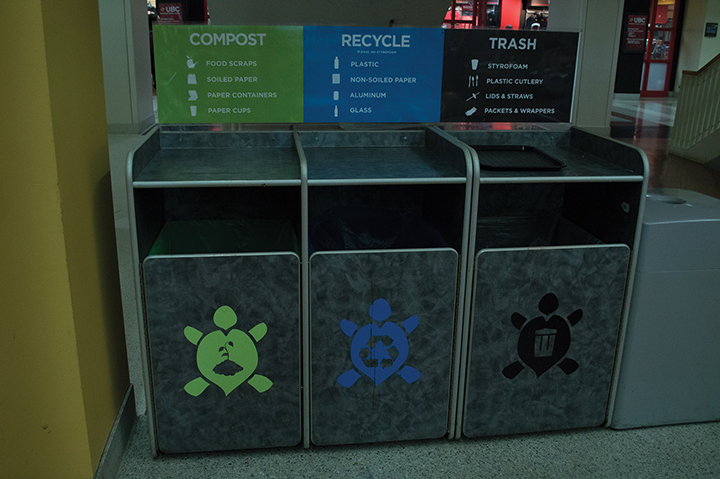Views expressed in opinion columns are the author’s own.
There is a number of very comprehensive trash, recycling and composting programs at the University of Maryland. This university has also received several awards for its accomplishments in environmentally friendly waste disposal, such as its April 2008 award for “least waste per person in the Atlantic Coast Conference of RecycleMania.”
In 2014, this university was ranked third in Maryland for waste minimization. As of 2011, every building on this campus uses single-stream recycling. This means all recyclable materials go into one bin, so it is easier for staff and students to recycle.
[Read more: UMD is expanding its on-campus composting program]
That being said, one major improvement still needs to be made: Composting for some South Campus residences should be more accessible. For students who live in on-campus apartments with kitchens, both food waste and non-recyclables usually end up in the same bin. We have easy access to recycling and trash dumpsters only, meaning lots of food waste goes uncomposted.
Additionally, compostable materials must be collected in approved bags. In buildings such as Stamp Student Union or dorms such as Dorchester and Prince Frederick halls, composting bins are available with bags already inside. However, other South Campus residents — including myself — have to provide our own compostable bags in addition to taking our food waste to one of these buildings. This makes composting even more inconvenient — there is no easily accessible location to dispose of this food waste.
On top of that, the compost bins in most of these buildings are small. Students who live in dorms with a kitchen know the amount of food waste generated wouldn’t really fit into one of these small bins, and therefore, would opt for the ease of putting everything into the dumpster marked “trash.”
This university is striving toward having compost bins in every academic and administrative building on campus, but it should prioritize making composting accessible to all dorms.
Facilities Management recycling specialist Adrienne Small told The Diamondback that while roughly 60 percent of waste on this campus is compostable, very little of it actually gets composted.
Ultimately, a change needs to be made. This university could be composting much more of its food waste by making composting accessible to on-campus residents, especially those of us who live in dorms with kitchens. This could be a big step toward making this university more environmentally friendly and efficient.
Liyanga de Silva is a sophomore English major. She can be reached at liyanga.a.ds@gmail.com.



